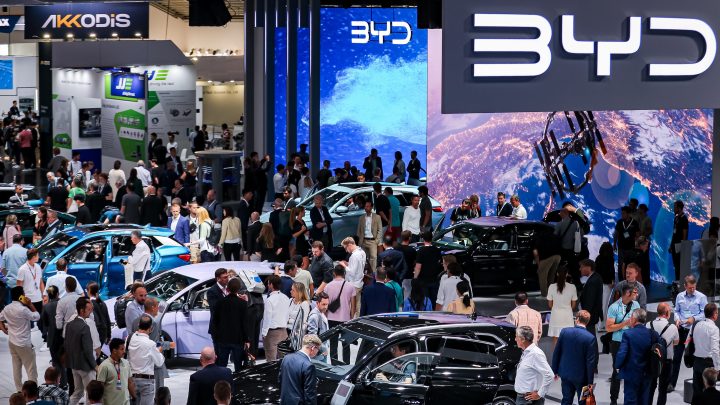
The European Union takes aim at Chinese subsides for electric vehicles
The European Union takes aim at Chinese subsides for electric vehicles

The Shanghai Auto Show in April was the first time since Covid that a lot of European auto executives had been to China.
“They were in awe. Jaws dropped. I think they really came to the realization that in many ways they were surpassed,” recalled Tu Le, managing director of Sino Auto Insights.
The European Union today formally launched an investigation into Chinese subsidies for electric vehicle manufacturers, a move that touches at the heart of a tense debate over how exactly China came to dominate both the EV industry as well as the battery industry that supplies it. China has decried the step as “naked protectionism.”
On the one hand, Chinese electric car companies are extremely innovative by all accounts. Chinese firms invested in cheaper battery chemistry the rest of the world dismissed. Chinese EV maker BYD is backed by Warren Buffett and is within a hair of overtaking Tesla in global sales.
“China’s EV supply chain has become very competitive and vertically integrated,” said Michael Davidson, an assistant professor at the University of California San Diego. Vertically integrated meaning the same company makes the car and its parts — like the battery.
“Something that western manufacturers have struggled to do with the exception of Tesla,” said Ilaria Mazzocco, a senior fellow at the Center for Strategic and International Studies.
On the other hand, China’s government at multiple levels has offered significant subsidies for many years.
Chinese automakers’ dominance “is not just a result of just success and competitiveness of Chinese companies or innovativeness of its researchers. It’s also the result of very, very systematic government support that has been in play since 2001,” argued Nargiza Salidjanova, a director with Rhodium Group.
Europe wants to avoid the fate that befell Europe’s solar industry a decade ago, which was mostly wiped off the continent by low cost competition from Chinese competitors that benefitted from consistent government support.
Some of China’s subsidies are tools even the U.S. has used — tax breaks, incentives for consumers to purchase more EV’s. Others go beyond what the EU considers fair.
“Manufacturers benefit from direct grants but also cheap credit,” said Mazzocco. “Some sectors can access credit more easily and we found access to below market credit was extremely significant in the Chinese economy. There are so called government guidance funds which are essentially government private equity.”
A Nikkei Asia analysis shows subsidies valued in the billions of U.S. dollars accelerated for many firms this year. Unlike in the U.S. or Europe, China’s government support goes back decades.
“The Chinese government decided we’re going to invest in these things — the U.S. and the EU could have done the exact same thing but they chose to ignore it,” said Sino Auto Insights’ Le, who points to the Inflation Reduction Act’s significant — but recent — subsidies for electric vehicles and battery technology in the U.S.
The U.S., for its part, is “insulated from Chinese EV’s due to existing tariffs,” said Mazzocco. But as Chinese cars get more competitive, that insulation might wear thin. Mazzocco said both Europe and the U.S. may consider allowing Chinese companies to move manufacturing to Europe or the U.S.
“I think ultimately the commission and many of the member states would be quite happy if Chinese firms set up shop in Europe and sold in Europe rather than producing in China,” he said.
Clouding the outlook is that in pursuing its investigation of Chinese subsidies, the continent is internally divided, said Le, over how much of a trade fight to pick with China.
“It’s the French versus the Germans because companies like Renault Citroen Peugeot, they effectively have no presence in China,” he said.
The German auto industry does — Volkswagen announced earlier this year it was investing $1.1 billion in car manufacturing within China.
Further complicating things is the fact that non-Chinese companies are availing themselves of China’s manufacturing base. 40% of cars coming into Europe from China are Teslas, said Mazzocco.
Europe is also trying to meet climate goals and needs more electric vehicles.
“There’s a real tension of these countries trying to protect their EV industries — can they do that fast enough to displace fossil fuel cars on time to meet climate goals,” said Davidson.
The EU has up to 12 months under the law to complete its subsidies investigation, and thread all those needles.
There’s a lot happening in the world. Through it all, Marketplace is here for you.
You rely on Marketplace to break down the world’s events and tell you how it affects you in a fact-based, approachable way. We rely on your financial support to keep making that possible.
Your donation today powers the independent journalism that you rely on. For just $5/month, you can help sustain Marketplace so we can keep reporting on the things that matter to you.

















